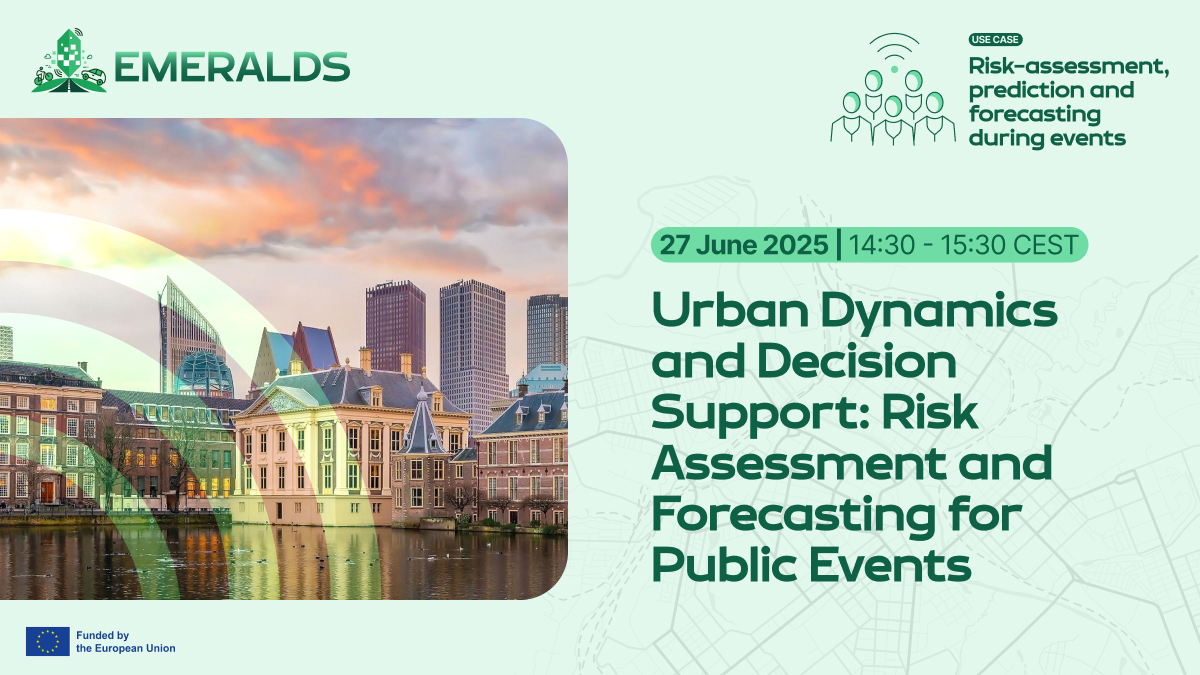
Managing safety in urban environments—particularly during large-scale events—requires timely and informed decision-making based on real-world dynamics. This EMERALDS webinar explores how researchers from Argaleo and the Delft University of Technology, in collaboration with the Municipality of The Hague, are developing a decision support system designed to help cities prepare for, and respond to, risks during public gatherings.
With The Hague often hosting demonstrations, welcoming tourists, and managing seasonal crowds along its coastline, the city provides a complex and relevant testing ground. The use case presented in this session focuses on making practical use of the vast streams of data already available to municipalities.
The session will introduce a dual-method approach developed within EMERALDS: one to predict situational variables such as crowd density and environmental factors, and another that considers contextual indicators including event characteristics and public sentiment. Combined, these methods aim to assess potential risks and determine the need for early interventions.
By bringing together research, urban governance, and operational insights, this webinar invites participants to reflect on how data-driven systems might support real-time responses and long-term urban planning.
Speakers
- Konstantinos Dafloukas - Inlecom Innovation - Project Coordinator
- Sascha Hoogendoorn-Lanser - TU Delft - UC WP Leader
- Jeroen Steenbakkers - Argaleo - UC Leader
- Marialetizia Mari – Trust-IT (moderator)
Agenda
| Timing | Speaker(s) | Topics and Discussion | |
|---|---|---|---|
Welcome & EMERALDS Project Introduction |
|||
| 14:30 - 14:40 |
Konstantinos Dafloukas |
Setting the Foundation and the Framework
|
|
Session: Bridging risk assessment and decisions |
|||
| 14:40 - 14:55 | Sascha Hoogendoorn-Lanser |
Presentation of the umbrella framework connecting all three use cases. Introduction to the dual-method approach:
|
|
Session: The Hague as a testing ground |
|||
| 14:55 - 15:25 | Jeroen Steenbakkers |
Demonstrations and public gatherings management:
|
|
Session: Q&A Session |
|||
| 15:25 - 15:30 | All the Panellists | Interactive discussion with participants on implementation challenges and solutions | |
Audience
- Municipal Officials and Urban Planners
- City managers and deputy mayors responsible for public safety
- Urban planning departments dealing with crowd management and event coordination
- Municipal data officers and smart city initiative leaders
- Emergency management coordinators and crisis response teams
- Public Safety and Security Professionals
- Police commanders and public order specialists
- Event security managers and crowd control experts
- Emergency services coordinators (fire, medical, evacuation planning)
- Risk assessment professionals in a public sector organisation
- Research and Academic Community
- Urban studies researchers focusing on smart city technologies
- AI and data science researchers working on predictive analytics
- Social scientists studying crowd behaviour and urban dynamics
- Graduate students in urban planning, public administration, and computer science
- Technology and Industry Stakeholders
- Smart city technology vendors and solution providers
- Public safety technology companies
- Data analytics firms serving municipal clients
- Urban IoT and sensor network specialists
- Policy and Governance Experts
- EU policy makers involved in urban development and digital transformation
- National government officials working on smart city initiatives
- Urban resilience and sustainability consultants
- Legal experts specialising in data governance and privacy in public sector applications
- Event Management Professionals
- Large-scale event organisers and festival coordinators
- Tourism board officials managing visitor flow and safety
- Transportation authorities dealing with crowd-related mobility challenges
- Venue managers for stadiums, conference centres, and public spaces